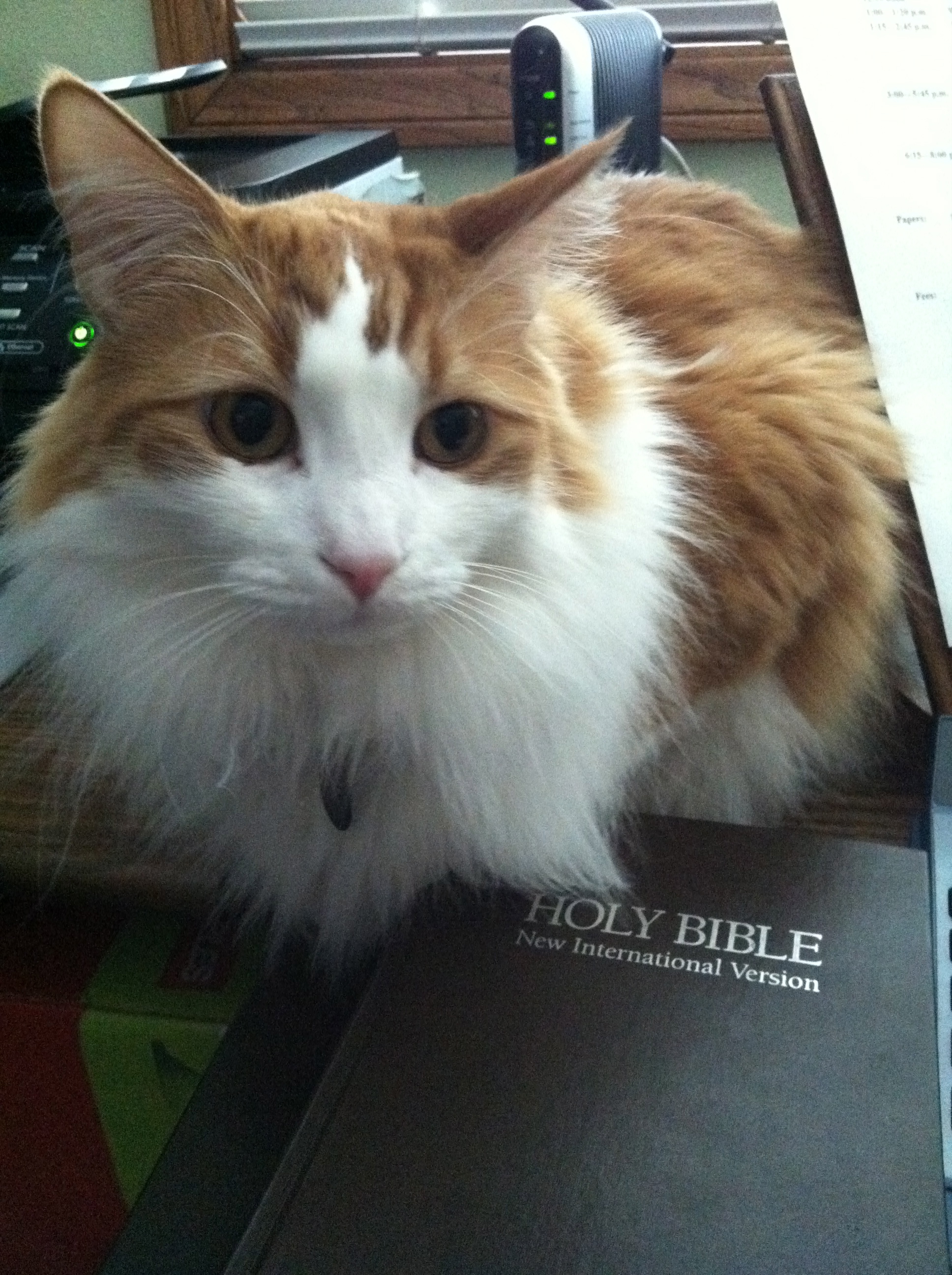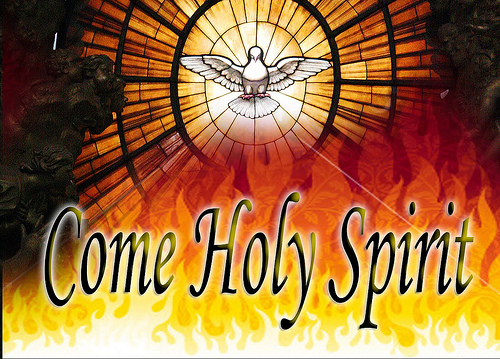“A Piece of My Mind”
June 2013 Newsletter from Donald Shoemaker
Advancing Christian Faith and Values, Defending Religious Liberty for All, Supporting Civility and the Common Good through Preaching, Teaching, Writing, Activism and Reasoned Conversations
“Prophets are Good for Business”
“Animals’ Day Off”—Sabbath-keeping (Part 2)”

“I’m Pumpkin,
and I approve
this message.”
“Remember the Sabbath day by keeping it holy. Six days you shall labor and do all your work, but the seventh day is a sabbath to the Lord your God. On it you shall not do any work, neither you, nor your son or daughter, nor your male or female servant, nor your animals, nor any foreigner residing in your towns.” – The 4th Commandment (Exodus 20:8-10 NIV)
“Sabbath Keeping” has something to say about how we treat animals!
On the Sabbath not only should you do no work—your animals have the day off too! So this becomes one of the provisions given in the Old Testament for caring for animals. Here are two more:
- Proverbs 12:10 – “A righteous man cares for the needs of his animal.”
- Deuteronomy 25:4 – “Do not muzzle the ox while it is treading out the grain.” (The ox that gets hungry on the job may eat the owner’s produce.)
The Bible is clear that human beings stand at the top of the “creature list”. God crowned us with glory and honor and placed us as rulers over the works of his hands—over all flocks and herds, and the beasts of the field (see Psalm 8). But animals are “not nothing,” and the more any creature possesses “sentience” (has a consciousness of situations, needs, fear, danger, pain, etc.), the more claim there is for a higher measure of care.
Jesus taught us that God cares for even the little sparrow and adds, “You are worth more than many sparrows” (Matthew 10:29-31—maybe 8?!!). His words (which some might call “specieist”) are an argument from the lesser to the greater—if God cares for the insignificant sparrow (and he does), how much more must he care for the crown of his creation!
How can our care of animals conform to the spirit of Sabbath law?
- All animals and birds that “work for us” (beasts of burden, providers of food or products, etc.) should be cared for in a “Sabbath-friendly” way. We care for them not just because it is “good for business” to have healthy animals but because it is “good”.
- The Sabbath principle of animal care should turn us away from gratuitous killing. That animals should not be purposely harmed just for sport should go without saying, but sadly it needs said.
- Animals must receive humane care. Even their killing for human consumption should be as humane as possible.
- If you want a pet, consider one that has been “rescued.” All of our cats and our dog are “rescue” pets in one way or another.
- Consider a donation to your local pet shelter.

Bible Insight – More on the Day of Pentecost
“When he ascended on high, he led captives in his train and gave gifts to men.”
(Ephesians 4:8 New International Version)
Most Christians I know observe Easter. Most Christians I know don’t observe Ascension Sunday or Pentecost Sunday. But the Easter message is not complete without the Ascension of Christ and Day of Pentecost accounts. If you observe one you should observe three.
According to the verse above, the ascension of Jesus back to his Father in Heaven (read the account in the Book of Acts, 1:1-11) made two very important spiritual realities possible:
-
Jesus “led captives in his train”. The verse is taken from Psalm 68:18. The psalm depicts God as a conquering king. In this verse, God does what conquering kings did—take captive the defeated as they please. In Jesus’ death, resurrection and ascension he conquered evil powers. Jesus disarmed “the powers and authorities…triumphing over them by the cross” (Colossians 2:15).
It’s a long story. Simply put, Jesus’ victory over evil was decisive (Mel Gibson got it right in the movie!). But it was not the final battle, which is yet to come (just as “D-Day” was decisive in World War II but not the end). Grasp this and, among other things, Communion Services will be more celebratory and less gloomy.
- Jesus “gave gifts to men”. These are the “gifts of the Spirit” or, more precisely in the context, gifted people (such as pastor-teachers) who will lead others to spiritual maturity and ministry. No ascension, no Pentecost; no Pentecost, no spiritual gifts in the church; no gifts, no ministry; no ministry, no impact on the world.
So, if we choose to observe Easter (and I do), let’s also learn and celebrate the meaning of Jesus’ ascension and Pentecost, the great day of the Spirit’s coming with gifts and power.
As the Apostle Peter spoke of Jesus so eloquently on that day, “Exalted to the right hand of God, he has received from the Father the promised Holy Spirit and has poured out what you now see and hear.” (Acts 2:33)
Religious Liberty Vigilance

“Congress shall make no law respecting an establishment of religion, or prohibiting the free exercise thereof…”
– 1st Amendment (Our “First Freedom” in the Bill of Rights)
“Those who expect to reap the blessings of freedom must…undergo the fatigue of supporting it.”
– Thomas Paine
Michael Gerson recently gave this thought about our religious heritage: “The overwhelming majority of Americans in the mid-20th century identified themselves culturally as Protestants, Catholics or Jews, no matter their personal beliefs.” *
Today, he says, we see instead (1) a lowering of interest in “institutional” religion (many opting instead for a discount brand of “spirituality”—my observation), and (2) polarization (“Institutional religion has gained a larger body of critics.”).
I would add: we also see (1) government moving increasingly into areas where private institutions such as religious bodies used to do their charitable efforts relatively free from state pressure, and (2) radical secularization (not by a large element of society, but a powerful one) that marginalizes and even strives to exclude religion from the marketplace of influence.
Gerson observes that secularists should restrain their cheers:
Those cheering the trend of religious disaffiliation should consider some broader social consequences. The rise of the nones [those who indicate no religious affiliation] is symptomatic of the decline of many forms of belonging… The unaffiliated donate less to charity than do the affiliated. They participate in fewer volunteer organizations. Individualism can easily become atomization. Whatever else you may think of the communitarian creeds, they help create community.
Robust religious liberty is the potential victim in all this. Those of us who are convinced that religious beliefs are the foundation of social values and those who (while not believing this) nonetheless accept and understand what true religious liberty is all about will be concerned.
Beyond concern, we must redouble our efforts to speak out for and secure the practical applications of religious liberty in our society. In other words, we must take seriously the exhortation of Thomas Paine: “Those who expect to reap the blessings of freedom must…undergo the fatigue of supporting it.”
(* Michael Gerson, “A country increasingly polarized by religion”, March 28, 2013)
Grace Community Church of Seal Beach has a new project to spiff up our Children’s Ministry area among other major improvements (office area). A plain, utilitarian hallway will be made to look like a beach scene. The same motif is throughout the classrooms and stairways—all befitting a church near the coast and all meant to make the children feel special.
The project is called—what else for a beach church?—”Wave 2″ (there was a “Wave 1”). The goal for the project is $200,000. It is well worth the support of all who see value in an excellent program for children.
Upcoming Ministries

5 Sundays in June—Speak at 1st United Methodist Church of Seal Beach on “The Lord’s Prayer” (9:30 a.m.)
July 26-31 – Participate in “Vision 2020 South”, Leadership Conference of the Fellowship of Grace Brethren Churches (Atlanta). Present resolutions to the Conference as Chairman of the Social Concerns Committee.
Message of the Month – A Church of the Word and Human Beings—without the Whiz-Bang
“The Word became flesh and made his dwelling among us.” – John 1:14
“You are Peter, and on this rock I will build my church.” – Matthew 16:18
Steven Spielberg recently said this about his great movie, “Lincoln”:
Special effects, high-genre concepts, big set pieces, eventizing history have been what I’ve been doing with both my imagination and on films that are based on historical fact. But I’ve never before made a film without all of those nets for me to fall into. I’ve never made a film where this was going to succeed or fail based on the writing and based on the performances. [italics mine]
That, he added, “is one of the scariest things I’ve ever gone into.”
If that’s scary, imagine having a church’s ministries succeed or fail based on the “script” (the Bible) and on the performance of its “actors” (us) without the benefit of gizmos and gadgets and gimmicks (like Spielberg’s “high-genre concepts, big set pieces” and other “nets to fall into”) we seem to think are essential to having a successful church. Really scary!
One Sunday morning a couple of years ago, my church had to conduct most of two services without electricity when power went out over much of “Old Town” Seal Beach. We had to rely on natural lighting, instruments without any enhancements, the words in our hands, and the voice projected by my own lungs. That’s sort of Spielberg’s “Lincoln” movie.
I hasten to say I wouldn’t want a Sunday like that very often. But the experience reminded us that, ultimately, “church” is people and the script we read and teach and live. That’s called “incarnational ministry” —being a flesh-and-blood church that follows our Lord, who came to us as flesh-and-blood and lived amongst us—a church shepherded by flesh-and-blood leaders like Peter, warts and all.
Let’s ask ourselves, what kind of a church would we be if all of a sudden we had nothing but Jesus, our script and our humanity?
Appendix – Since writing on “Contemporary Worship” in the February Newsletter, http://donaldshoemakerministries.com/blog/?p=164 I’ve given thought to how we can avoid error and at the same time appropriately accommodate some of the practices I’d rather not see in worship gatherings.
When I was a teen, “Youth For Christ” was the place to take your non-Christian friends (perhaps more than taking them to your church for their first “Gospel” experience). YFC rallies were “platform performances” where the audience was more in an observance mode than participation. Everything (including technology good for the times) was geared to the teens and prayerfully intended to lead to some conversions. (Read Billy Graham’s autobiography and see how this was the vision of YFC.)
We didn’t look on YFC as primarily a place for worship or spiritual growth, though those did take place. We looked for evangelism, through song, drama, message and just a really good program. I was trained as an evangelism counselor.
I suggest that some, if not many, “contemporary worship” experiences are like YFC during my teen years. They are striving to reach a generation for Christ, and many are doing a pretty good job of it.
I think we can make a New Testament distinction between a gathering geared for conversion and a gathering for worship and growth. Isn’t this distinction found at the very beginning of the Christian Church? “Those who accepted his message were baptized” [the evangelistic gathering], and “they devoted themselves to the apostles’ teaching and to the fellowship, to the breaking of bread [likely the incipient Eucharist] and to prayer” [the worship/growth gatherings]” (Acts 2:41-42 NIV).
That said, and if correct, two results should take place:
- Christians (especially new converts) attending the evangelistic occasion should not view that occasion as “church” (the gathering of believers for worship, doctrinal instruction and growth) or as a substitute for “church”. We who were so zealous for YFC and its evangelism potential—never would we have thought that the YFC rally was a substitute for our faithful participation in worship at our various local churches. The evangelistic gathering needs to be supplemented by a gathering of believers for doctrinal instruction, prayer, mutual ministry and celebration of the Eucharist.
- In the observance of the ordinances (sacraments), baptism can be a vital part of the evangelism experience (I would prefer, in this case, that baptisms be connected to a local church). Communion (the Eucharist) on the other hand should NOT be part of this experience as it is an observance intended for the gathered community of worshipping believers. Baptism is tied to evangelism; Communion is tied to spiritual growth. (This may sound like I am making too sharp a distinction between the two kinds of gatherings—not my desire. Growth will take place in an evangelism context, evangelism in a worship context. But the two gatherings have distinct and different intentions.)





